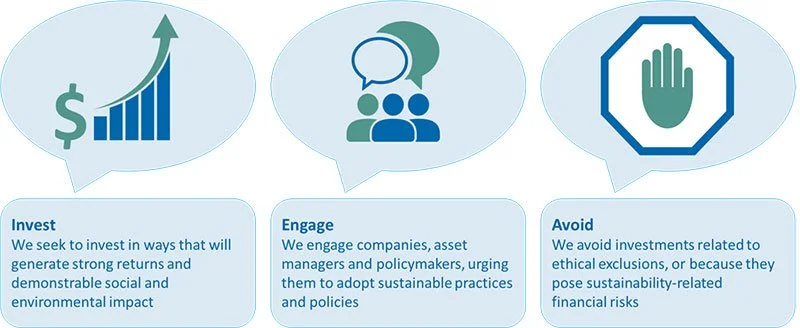What John Wesley's "3 Simple Rules" Teach Us About Values Aligned Investing
By Karen Manczko, Wespath’s Director of Institutional Relationships, originally published October 2, 2023 on Wespath.com.
Earlier this year I spent a week traveling around western Ohio with Susan Black, Executive Director of UMF of West Ohio (UWFWO), meeting with local churches and learning more about their investment needs. UMFWO is one of many Methodist foundations that Wespath partners with to provide institutional investment services, making the foundation community an integral part of the over 100,000 benefit plan participants and more than 150 institutional investors we serve.
Susan and I got to discuss how Wespath's partnership with UMFWO helps ensure that current and prospective investors can align their investments with the mission of the Church, all while seeking the competitive returns necessary to support their unique financial objectives.
I love traveling with our partners and meeting with individual churches. Though I hope they are learning valuable investment insights from me, I'm sure I'm learning even more from them by connecting and hearing about their experiences.
During our travels, Susan and I began talking about the alignment of values—and, importantly, what exactly that means in the context of investing. "Values alignment" is obviously a broad term that can mean many different things to different people. Fortunately for Wespath, Susan and UMFWO, their local Methodist churches, and all the other foundations and partners we serve, there is a common thread to guide us: the principles and teachings of John Wesley, the founder of the Methodist movement.
Wesley provided countless lessons that are relevant to us as investors and partners in mission. Over the years, these expressions have evolved and been combined into the popular phrases we know today. The "Gain all you can, Save all you can, Give all you can." phrase popularized by Wesley's "Use of Money" sermon is, of course, relevant to our work.
For me, another Wesley-inspired saying that always comes to mind is, "Do all the good you can, by all the means you can, in all the ways you can, in all the places you can, at all the times you can, to all the people you can, as long as ever you can."
While this is quite a lofty goal, to me this saying embodies Wesley's focus on a life of active and pragmatic Christian faith, which is a value many can agree on.
Related to this is a set of Wesleyan rules, formally referred to as John Wesley's "General Rules on Our United Societies," but famously simplified to Wesley's "three simple rules" by Bishop Rueben P. Job. The late bishop summarized Wesley's rules as:
Do no harm.
Do good.
Stay in love with God.
John Wesley's legacy is marked by his teachings on social justice, compassion, and the vital role of actively expressing one's faith through acts of kindness, charity, and service to others. This philosophy urges individuals to consistently seek opportunities to create a positive impact in the world. The instructions to ‘Do no harm, do good and stay in love with God’ provide a simple-but-helpful perspective to guide that action!
Here at Wespath, I see clear connections between these rules and the work we do on behalf of our participants and institutional investors. For example, we are always called to empower our mission of ‘caring for those who serve’ and upholding our core values of Mutual Respect, Teamwork, Integrity, Stewardship, Customer Satisfaction and Spirituality. We also strive to live into our Wesleyan values more specifically through our investment work, including through the actions that guide our Sustainable Economy Framework and our ‘Invest-Engage-Avoid’ approach.
Let’s take a closer look at how this approach can be applied to Wesley’s three simple rules:
#1: Do no harm.
This rule provides an important foundation by highlighting what not to do.
In our line of work, this rule is most closely related to an investor’s decisions about what types of investments they want to avoid. At Wespath, this mantra is evident in our ethical exclusions—an element of our ‘Avoid’ action step which excludes products and companies we do not invest in based on their misalignment with Methodist values.
#2: Do good.
Wesley refers to this rule as actively engaging in acts of kindness, charity, and service to others. It encourages people to seek opportunities that make a positive difference in the world and help those in need.
I see this rule most exemplified in our work to make positive impact investments that bring about positive change in our communities. For example, here in the U.S., the need for affordable housing is particularly pressing. According to the National Low-Income Housing Coalition, there is a shortfall of seven million affordable housing units available to those in need.
Wespath’s Positive Social Purpose (PSP) Lending Program, our longest running impact investment initiative, aims to provide a solution to this problem. Since its inception in 1990, the PSP Lending Program has invested over $2 billion, helping create or preserve over 52,000 affordable housing units. PSP has also proven that this positive impact can be achieved while generating market-rate returns and fulfilling our fiduciary duty.
#3: Stay in love with God.
In the words of Bishop Job, staying in love with God is how we ‘find our moral direction, our wisdom, our courage, our strength to live faithfully from the One who authored us, called us, sustains us, and sends us into the world as witnesses who daily practice the way of living with Jesus.’ In other words, this rule is about how we take our faith and values and put them into action in the real world.
This directly correlates to Wespath’s shareholder engagement activities, wherein we use our voice as a large shareholder to encourage corporations to adopt sustainable business practices. We do this because we believe engagement is a powerful tool that aligns with Methodist values and can improve financial returns, and we always appreciate the opportunity to bring the Methodist voice to the table on important issues like workplace safety, human rights abuses, board governance and many more.
This rule also underscores the importance of building strong connections and maintaining close relationships. It makes me think back to my conversation with Susan and how thankful I am to support UMFWO in western Ohio—and all the other Methodist foundations and institutions that we are entrusted with to manage their assets. I truly feel this community—alongside our plan participants and all our other institutional investors—is a shining example of how to live out our values.
At Wespath, we contribute to that effort by providing investment services which align with those values and provide strong, long-term investment returns that help people reach their full financial potential. I’m proud we can continue to play that important role!


